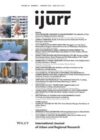In keeping with China’s desire to build soft power to parallel its economic growth, the policing of city streets has moved to the forefront as a mechanism for moral regulation and improving urban prestige. Under pressure to civilize their citizenry, many Chinese cities have become entrepreneurial cities within a type of cultural growth competition, using techniques of government to suppress stigmatized street behavior and increase courtesy and selflessness. Applying content analysis to the official Weixin account of the Shenzhen Traffic Police from 2017–2024, I illuminate the relationship between Shenzhen’s micro-practices of enforcement and the broader context of China’s attempt to instill moral quality in its people. As a form of nation-building, the cultural and moral remaking of cities through surveillance is as much creative as it is repressive. Traffic policing serves to maintain order and foster economic development, as models of the neoliberal city predict, but it is also influenced by genuine feelings of collective shame that demand wide-ranging cultural transformation.
Details
Written by:
Gregory Fayard
Digital Object Identifier (DOI)
https://doi.org/10.1111/1468-2427.70035
About DOI
